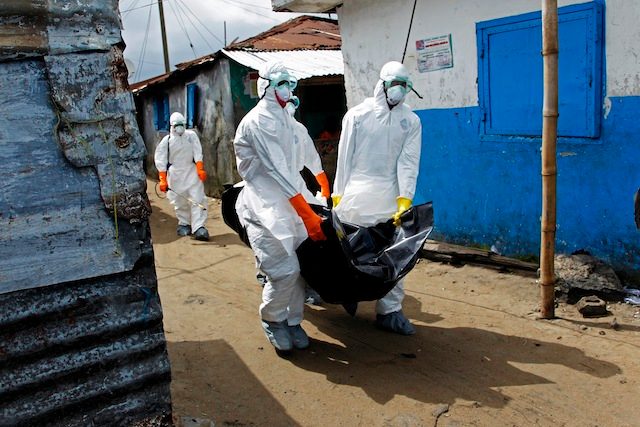SUMMARY
This is AI generated summarization, which may have errors. For context, always refer to the full article.

GENEVA, Switzerland (UPDATED) – The number of Ebola infections is set to explode unless the response is radically intensified, the WHO warned on Tuesday, September 23 predicting tens of thousands of cases by the end of the year.
The UN agency said in a report that new cases would increase from hundreds each week to thousands without “drastic improvements in control measures”, with infections more than tripling to 20,000 by November.
“We’ve rather modestly only extended the projections to November 2, but if you go to… January 2, you’re into hundreds of thousands,” said Christopher Dye, the head of strategy at the World Health Organization and a co-author of the study.
The research paper warns that the outbreak could drag out for years and become entrenched in west Africa, which has already seen almost 3,000 deaths.
The epidemic might simply “rumble on as it has for the last few months for the next few years,” Dye said, stressing that “the fear is that Ebola will become more or less a permanent feature of the human population”.
Liberia, the hardest-hit nation, has seen 3,000 cases and almost 1,600 deaths, with health workers turning people away from treatment units due to chronic shortages of beds and staff.
The country has some 150 foreign specialized medical workers on the ground and needs at least 600, and it is aiming to scale its current 400 Ebola beds up to around 2,000 within weeks.
Its response has been bolstered by a US military mission, already deploying, which will see 3,000 troops providing training and logistics.
‘Remedy an earthquake’
But Antonio Vigilante, UN deputy special representative for recovery and governance, likened the struggle to “trying to remedy an earthquake when it is happening”.
Liberia said Tuesday the slow international response risked allowing the country to slide back into civil war alongside neighbouring Sierra Leone, and could reignite civil unrest in Guinea.
“The world cannot wait for Liberia, Sierra Leone and Guinea to slip back into conflict, which could be the result of this slowness in response,” Information Minister Lewis Brown told AFP late Monday.
Sierra Leone, where more than 1,800 have been infected and nearly 600 have died, reported “an overflow of bodies” after a nationwide curfew helped uncover more than 200 new cases.
The WHO study, carried out with Imperial College London, forecast that, if no significant action were taken, the cumulative number of confirmed and probable cases by November 2 would be around 6,000 in Guinea, 10,000 in Liberia and 5,000 in Sierra Leone.
Higher infection rates would translate into a jump in the number of deaths as the experts suggested the real fatality rate was much higher than the widely estimated one in two, said the study published in the New England Journal of Medicine.
If only cases of deaths and recovery are taken into account, the real fatality rate stands at about 71%, the study showed.
“We are seeing exponential growth and we need to act now,” Dye said.
The United Nations is seeking to raise nearly $1 billion to defeat the Ebola outbreak, the worst ever recorded, which the Security Council has declared a threat to world peace.
Virus mutation
Ebola fever can fell its victims within days, causing severe muscle pain, vomiting, diarrhea and — in many cases — unstoppable internal and external bleeding. It is one of the deadliest viruses known to man.
The current crisis, which quietly began in southern Guinea last December, has killed far more than all other Ebola outbreaks combined.
Dye said that while the virus ravaging west Africa was acting similarly to previous outbreaks, what has changed is the density and mobility of the population affected.
Cultural practices like washing and touching dead bodies have compounded the problem, as has the very slow response in countries never before hit by the virus and by the international community, he said.
Weak health systems in the hardest-hit countries are also largely to blame, said Christl Donnelly, a professor of statistical epidemiology at the Imperial College and a co-author of the study.
“In Nigeria, for example, where health systems are stronger, the number of cases has so far been limited, despite the introduction of infection into the large cities of Lagos and Port Harcourt,” she said.
Ebola is only transmitted through contact with body fluids, so halting its spread is usually relatively simple.
Even in this epidemic, each Ebola patient on average infects only 1.7 people in Guinea, 1.8 in Liberia and two in Sierra Leone, the study showed.
“If it were an airborne transmitted disease… we would be in much bigger trouble than we are at the moment,” Dye said.
“It is possible,” he said, that the disease could mutate to be more easily transmitted through the air, but “we certainly haven’t see that yet.” – Rappler.com
Add a comment
How does this make you feel?
There are no comments yet. Add your comment to start the conversation.